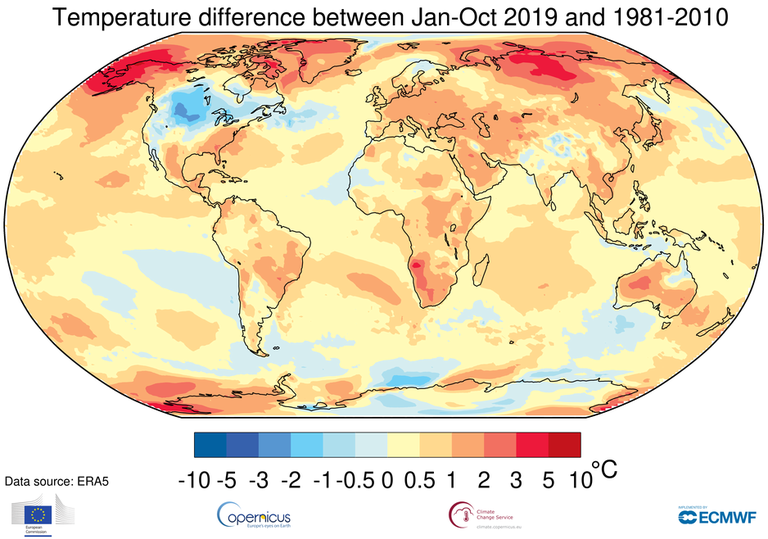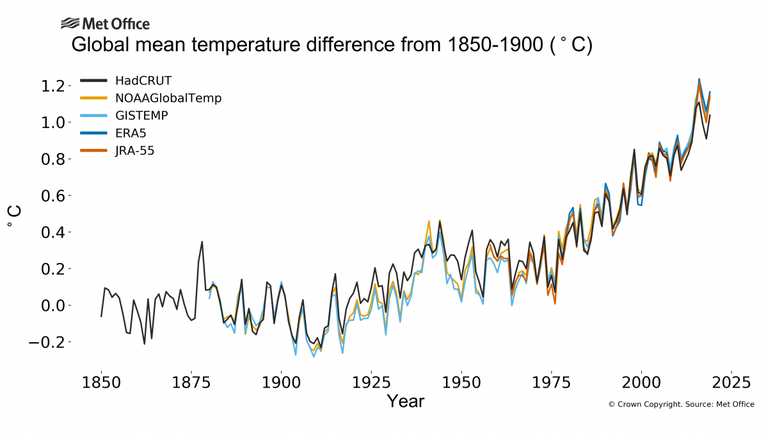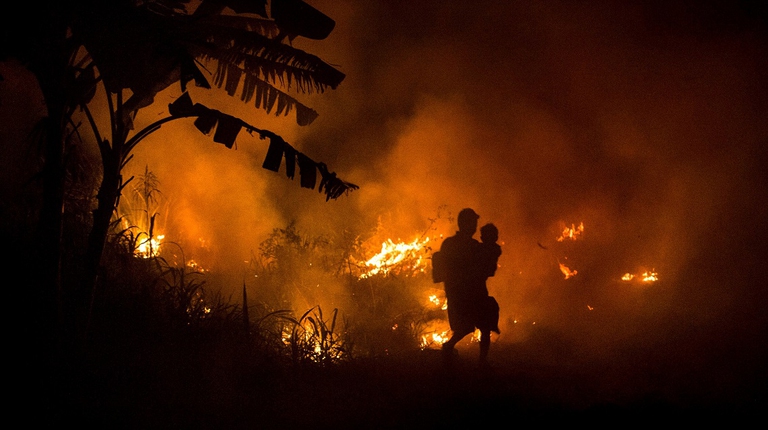
The 26th edition of the United Nations Climate Change Conference, COP26, will be held in Glasgow, Scotland in November 2020. The pre-COP will take place in Milan, Italy.
The last ten years have been the most “exceptional” and hottest decade ever, with extreme weather hitting people and ecosystems harder and more frequently. 2019 is also on course to becoming the second or third hottest year since records began.
2019 has been an unusual, exceptional year. Rarely have people, animals and ecosystems been hit so badly as they have in the past twelve months by the ever-worsening and more frequent consequences of climate change. And, just as the year comes to an end, it has been confirmed that 2019 marks the end of the hottest decade ever: ten years of extraordinary heat and extreme weather events.
According to data from the World Meteorological Organisation (WMO), the average temperature recorded between January and October 2019 was 1.1 degrees Centigrade higher than pre-industrial levels (between 1850 and 1900). It’s no coincidence that last October was the hottest ever recorded. With this data at hand, scientists predict that 2019 will be the second or third-hottest year in recorded history, with 2016 still topping the charts. Regardless, since the 1980s every decade has been hotter than the one before, with an increase of 0.1-0.2 degrees each time.
There’s no sign of a slowdown, let alone a decline, in greenhouse gases concentration in the atmosphere despite all the commitments under the Paris Agreement.Petteri Taalas, WMO Secretary General
COP25, the UN climate change conference to discuss what has, what hasn’t and what needs to be done, is currently being held in Madrid. The WMO published its data in time for the conference, and Petteri Taalas, its Secretary General, commented that, “if we don’t take urgent climate action now, then we’re heading for a temperature increase of more than 3 degrees Centigrade by the end of the century, with ever more harmful impacts on human wellbeing”. Taalas explains that, as things stand now, we’re nowhere near close to the objectives that would keep temperature rise well under 2 degrees by the end of the century.
Read more: COP25, a guide to the climate conference in Madrid: 5 things you need to know
However, it’s not all about temperature. November brought the news that a new high was recorded for CO2 levels in our atmosphere in 2018, reaching 407.8 parts per million. The last time levels were so elevated was sometime between three and five million years ago. And emissions increased once more in 2019, hitting a new record of 36.8 billion tonnes of CO2.
The WMO report also shows that the highest oceanic level since precise altimeter measurements started in 1993 was recorded in October 2019. Ocean temperatures are also constantly rising, almost to record heights. The same goes for acidification: seawater is 26 per cent more acidic than it was during the industrial era. The ice sheets also haven’t been spared: in 2019, Antarctica saw its lowest ice coverage over several months, and the second-lowest ever ice level was recorded in the Arctic.
Once again in 2019, weather and climate related risks hit hard.Petteri Taalas, WMO Secretary General
The WMO document – Provisional Statement on the State of the Global Climate in 2019 – will be published in its definitive and complete form in March 2020. It also contains investigations into the effects of the climate on human health (for example, thousands of people in Europe alone died this summer because of heatwaves), food security (12.3 million people are suffering in the Horn of Africa) and migration (whose main natural drivers in 2019 were floods, drought and storms).
“On a day-to-day basis, the impacts of climate change play out through extreme and ‘abnormal’ weather. Countries ranging from the Bahamas to Japan to Mozambique suffered the effect of devastating tropical cyclones,” Taalas emphasises. “Wildfires swept through the Arctic and Australia. Heatwaves and floods which used to be once in a century events are becoming more regular occurrences”. It’s this word, “regular”, that rings increasingly true in the context of the climate crisis because will inevitably replace the term “unusual” if we decide to stay on this course of inaction.
Siamo anche su WhatsApp. Segui il canale ufficiale LifeGate per restare aggiornata, aggiornato sulle ultime notizie e sulle nostre attività.
![]()
Quest'opera è distribuita con Licenza Creative Commons Attribuzione - Non commerciale - Non opere derivate 4.0 Internazionale.
The 26th edition of the United Nations Climate Change Conference, COP26, will be held in Glasgow, Scotland in November 2020. The pre-COP will take place in Milan, Italy.
Thanks to activists, the voice of the world’s peoples resounded through the COP25 like an alarm bell. Governments didn’t reach the results they demanded, but their cries and messages were stronger than ever, reaching even those who weren’t in Madrid.
Climate change poses a risk for millions. However, women are the most vulnerable to its negative consequences: a few simple considerations by the Italian Climate Network help us perceive the global implications of this.
The COP25 ended two days late and with very few steps ahead made. Climate negotiations in 2020 will be an uphill battle as political will clearly seems to be lacking, once again.
Unite Behind the Science: this was the title of the conference held at the COP25 on 10 December. Greta Thunberg’s presence filled the arena, but this time it was scientists’ turn to speak.
25,000 delegates meet for the COP25 from 2 to 13 December. What can we hope this UN climate change conference, whose venue was changed from Santiago de Chile to Madrid, will achieve?
100 eminent people from all over the world, including Vandana Shiva, Naomi Klein and Noam Chomsky, have signed an open letter after the disappointing results of the COP24. A call-to-arms for climate against world leaders’ indifference.
The outcome of the COP24 in Katowice left many unsatisfied. Greta Thunberg, a young Swedish environmental activist, gave a harsh, heartfelt speech addressing world leaders.
The COP24 climate conference is taking place in Katowice, Poland with the aim of establishing regulations that will bring the Paris Agreement into effect. And averting a planetary catastrophe.










